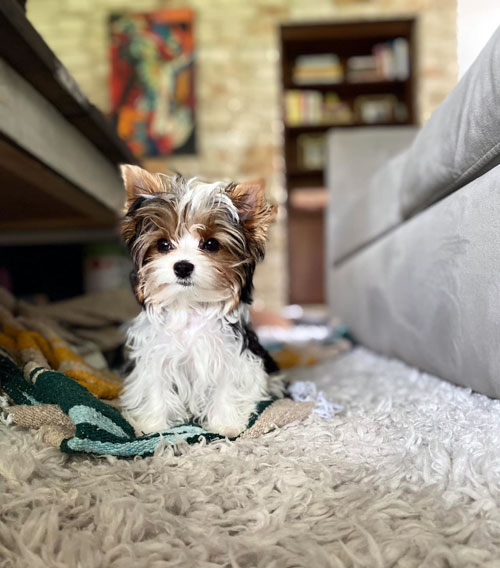Reverse sneezing is a common and typically benign condition seen in Biewers, also known as paroxysmal respiration or inspiratory stridor. This abrupt, involuntary respiratory reflex can be quite startling to dog owners. Manifesting as if your dog is snorting or gagging, these episodes can endure for a few seconds or even up to a minute. However, there’s no need for panic. Reverse sneezing is generally harmless, doesn’t lead to long-term health complications, and usually resolves on its own without any treatment. Though it may appear distressing, your dog normally resumes regular activity post-episode.
What Causes it?
The precise etiology of reverse sneezing remains a mystery, but it’s generally believed to stem from a spasm of the soft palate – the flap of tissue extending down from the roof of the dog’s mouth. This spasm can constrict the trachea, complicating the dog’s inhalation process. Various triggers, such as allergens, perfumes, dust, or a sudden change in temperature, might provoke this reaction. Additionally, overexcitement or rapid ingestion of food or water can sometimes instigate these episodes, adding another layer to this complex condition.
What Are the Symptoms?
The most common symptom of reverse sneezing is a series of loud snorts or gasps. Your Biewer Terrier may also paw at its nose or mouth, and its eyes may water. In some cases, the dog may even lose consciousness for a few seconds.
How to Stop Reverse Sneezing
There are a few things you can do to help stop a reverse sneezing episode:
- Hold your Biewer’s muzzle closed for a few seconds. This will help to open the trachea and allow the dog to breathe more easily.
- Gently stroke your dog’s throat or neck. This can help to relax the soft palate and stop the spasm.
- If your Biewer Terrier is very anxious, you can try to calm it down by petting it or talking to it in a soothing voice.

When to See a Vet
In most cases, it is a harmless condition that does not require any treatment. However, if your Biewer Terrier has frequent or severe episodes, or if the episodes are accompanied by other symptoms such as coughing, gagging, or difficulty breathing, you should see a veterinarian to rule out any underlying medical conditions.
Keywords: reverse sneezing, dogs, symptoms, causes, treatment, prevention, when to see a vet
Here are some additional guidelines to assist your dog during a reverse sneezing episode:
- Maintain your composure and avoid panicking. Your Biewer Terrier is sensitive to your emotions, and your anxiety might potentially exacerbate the episode.
- If your dog is standing, gently guide them into a seated or lying down position. This adjustment can aid in relaxing their throat muscles and facilitate easier breathing.
- Should your Biewer Terrier begin to paw at their nose or mouth, attempt to gently hold their paw still. This action can help thwart further irritation to their throat.
- If your dog seems particularly anxious, aim to pacify them by stroking their fur or using a soothing voice.
- Providing a distraction can also be beneficial. Encourage them to focus on a favorite toy or a simple command to shift their attention from the sneezing.
- In some cases, gently massaging the dog’s throat or lightly blowing in their face may help to interrupt the reflex.
- Always remember to consult with your vet if the reverse sneezing becomes frequent or if you observe additional symptoms.
It is a common and usually harmless condition in Biewer Terriers. If your dog experiences reverse sneezing, there is no need to panic. Just try to help your dog relax and the episode should pass on its own. However, if your dog has frequent or severe episodes, or if the episodes are accompanied by other symptoms such as coughing, gagging, or difficulty breathing, you should see a veterinarian to rule out any underlying medical conditions.
